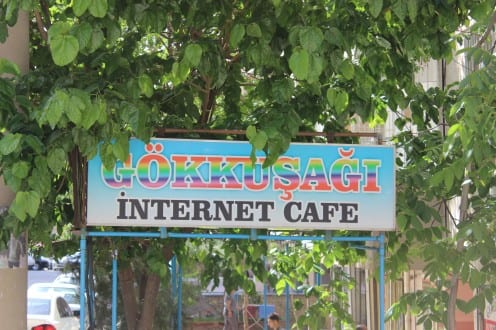Facebook for fitness: a case study from India
By Shriram Venkatraman, on 18 September 2013
The following is a case study of a fitness enthusiast (a small business owner as well – owns a gym) in our Indian fieldsite who shares his passion for body building and subtly influences his business members through Facebook.
Krishna, aged 28, is a body building enthusiast who just loves fitness to the extent that it was natural for him to start his fitness centre/gym immediately after he graduated. While pursuing his Bachelors in Business Administration at a college close to the fieldsite, he took on several part time jobs, all in the field of fitness, at various privately owned and community gyms both in the city of Chennai and in the villages surrounding it, working in a wide spectrum of roles from being an instructor to looking after the administration. He learnt through being an apprentice to various well known instructors. He read most of the well-known fitness magazines that his work place subscribed to. He was not just an instructor who only preached, but was also a walking proof by practicing his own ideals on fitness. He participated very actively in most of the state-based fitness competitions and has even won a few of them, which further added to his credibility.
He surrounded himself with friends (mostly young men) who were also interested in fitness and he seemed to have influenced most of them to get into body building, and even compete in a few city/state and national level competitions themselves. His network which mostly consisted of people who were seriously into fitness and body building, now seemed to have influenced him in turn by respectfully addressing him as their “Master”. They do this even now, and the gym members seemed to have forgotten his real name and just address him as their Master. His personal attention to the fitness of his friends seemed to go a long way. He volunteered to help them compete in competitions and thereby spread around this idea (in a way popularising himself as a brand too, as he did not have a business at that time). Hence, it was natural for him to look out for an opportunity to expand his passion and with a good business sense he turned his network of friends into clients. He started his own gym and had a ready network of friends who naturally joined the gym. A member of his network seemed to have even helped him with procuring the equipments, while one helped him with a bank loan and another with the space for the gym.
Now he is a the owner of this small business, who owns and runs an 1800 square foot gym in a rented area. The gym functions in an artificially created shed in the terrace of a building owned by his friend’s dad. Thanks to his friend’s influence, he pays a rent which is at least 60% less than the market price. He charges his members a very reasonable amount as his gym does not have any electronic equipment and is not air conditioned. His network expanded considerably and so did the gym membership, the membership roster boasts of approximately 200 members on a rotational basis. Given that this is a men-only gym with very limited facilities, this number seems to be significant. Also most most of the gyms for body building use rather than usual aerobic fitness regimes.
As body building requires huge amounts of motivation and inspirational stories and pictures, it required a significant amount of time to ensure that his members are motivated to turn up to the gym every day. Following up with them was itself a huge task. Cell phones helped him in this task, where calling members individually and talking to them personally and messaging them inspirational quotes helped, however sending inspirational pictures of body builders with quotes in them were not possible with the phone that he had. So, he turned to a cheaper but an effective and valuable option: Facebook.
He made sure to add most of his old members as his friends on Facebook and also asked every new member their Facebook ID and made sure to add all of them as his friends on Facebook. He send all his Facebook friends, who are his clients, pictures of body builders with inspirational quotes. He also sends them personal messages and pictures that he downloads from the internet. As a member of other international fitness groups on Facebook, he has all of these pictures and quotable quotes falling into his lap. He also shares stories of people in unfortunate circumstances and who have made it big and relates them to fitness. His way of caring, motivating and influencing his members/clients was now becoming easier. He says that he knows his members welcome this because, when they open their Facebook page every morning, they see a positive message with the picture of a strong man, which creates a positive energy in them to face the day and, in a way, subtlety influences them and reminds them of fitness and his gym.
He says his membership churn-over has reduced considerably since he adopted Facebook to communicate with them and has definitely helped in reducing a considerable amount of time/money spent over phone in motivating members to turn up for fitness. This method he feels is very non-intrusive. Further, he is now able to use his time effectively to concentrate on other business details and with Facebook groups, he uses them as a knowledge network to know the latest developments in the body building world, which has also brought down his magazine subscription charges. He prints out pictures of body builders and inspirational quotes that he gets on Facebook and now pastes them in his gym, to motivate those working out in the gym. Of course, he also relies on phone to communicate with people with whom Facebook doesn’t work or who are not into Facebook. He says his presence on Facebook also has helped him attract new members in the area. So when people search for gyms in the area, his name stands out with the area name. His Facebook ID is a combination of the name of the gym and his name, as well and with his geographical details are given, it’s pretty certain that his name stands out when people search for a gym in this area. Surprisingly, he doesn’t have a page for his gym and he says he doesn’t want to create one simply for the reason that his clients would then be clients and lose personal touch with him if he has a page instead of his profile. A profile makes sure his clients are his friends and it shows he cares for them.
 Close
Close






